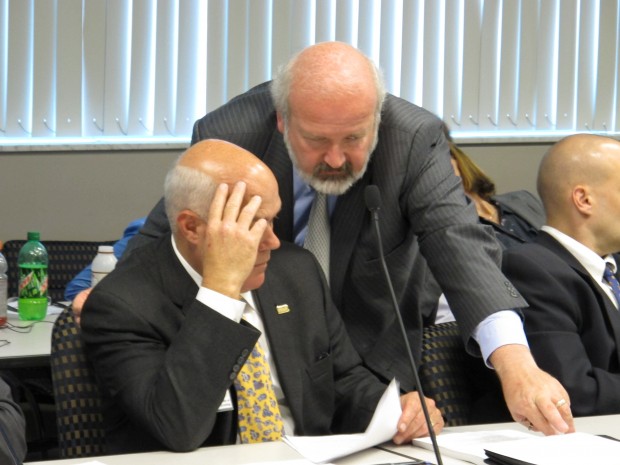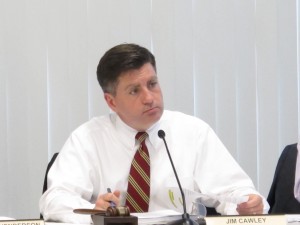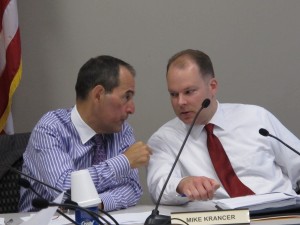How Friday’s Marcellus Shale Advisory Commission Vote Will Impact Pennsylvania’s Laws
-
Scott Detrow

Scott Detrow / StateImpactPA
Commission members Jeff Wheeland (L) and Dave Sanko (R) discuss an amendment to a recommendation during Friday’s meeting
This much we know: an endorsement of an impact fee on natural gas drillers is among the 96 recommendations Governor Corbett’s Marcellus Shale Advisory Commission approved Friday.
The panel’s report will also urge Corbett and lawmakers to revisit the 1961 law governing gas and mineral extraction, in order to possibly include the Marcellus among the formations where companies can use “forced pooling” to extract gas.
Beyond those two hot-button issues, we’ll have to wait until the report is made public next Friday to fully understand what the commission is recommending, and what that will mean for drilling regulations and policy. That’s because the commission did not release the recommendations it voted on today. Members outlined summaries of the suggestions during the public meeting, but reporters and observers weren’t able to study their details. (More on that later.)
Commission Endorses Impact Fee

Scott Detrow / StateImpact Pennsylvania
Lieutenant Governor Jim Cawley presides over Friday’s meeting
First, the fee. According to Lieutenant Governor Jim Cawley, the commission will inform Corbett that drilling and its side effects are straining local governments, and that counties and municipalities aren’t receiving enough additional tax income to meet their increased demands. The report will recommend some sort of impact fee to fix this situation – but it won’t suggest a specific approach. “What our charge was from the governor was to determine whether or not there were uncompensated impacts that might require an impact fee,” said Cawley. “And in some cases, we did in fact find that there are. …That is a matter that we believe best resides in the legislative process, working cooperatively. We did not feel it appropriate to get to – to get down to that.”
As broad as it may be, the commission’s recommendation matters, because Governor Corbett has said time and time again that he’ll base his decision of whether to block or embrace the high-profile issue on what the panel suggests. Legislative support for some sort of fee continues to grow on both sides of the aisle, and Corbett singlehandedly blocked the bill from passing last month, by threatening to veto anything that reached his desk before the commission finished its work. If Corbett says he’d sign a fee, expect the matter to be settled before year’s end.
Forced Pooling

Scott Detrow / StateImpactPA
Department of Environmental Protection Secretary Mike Krancer (l) talks to Energy Executive Patrick Henderson (r) during Friday’s meeting
The commission also approved language urging Corbett and lawmakers to revisit the issue of “forced pooling,” which, under certain circumstances, allows drillers to extract gas from underneath the property of unwilling landowners. Because of a loophole in the 1961 law regulating the issue, drillers have that right – a sort of eminent domain – for other formations, but not the Marcellus. Corbett’s energy executive, Patrick Henderson, said officials should take a new look at the statute. “It was a very different industry, certainly with horizontal and directional drilling [in 1961],” he said. “So I think what many members of the commission – not to speak for them, but my takeaway – was that there was a recognition that especially if the Utica Shale is subject to the statute, we need to revisit.”
What’s Next
Corbett had been a vocal opponent of forced pooling in the past, which brings us to our next point: the commission’s recommendations, by themselves, won’t change a single line of Pennsylvania laws. They’ll simply go to Corbett, who can choose to follow or ignore each suggestion. “Let me make it very clear,” Cawley reiterated at a press conference. “This document, in its entirety, is a recommendation to the governor. No work begins until he says go.” Corbett will have the power to enact many of the regulatory changes through executive order, but the bulk of the commission’s suggestions would need to be accomplished through new laws.
That likely won’t be a slam dunk. As we reported earlier this week, Senate Republican leaders aren’t exactly eager to re-write their drilling legislation, based on the commission’s findings. And Democrats aren’t embracing the report, either. Allegheny County Representative Dan Frankel, a member of the House Democratic leadership, released this inflammatory statement within an hour of the commission’s final vote: “…the governor’s commission is refusing to publicly release the documents detailing its own recommendations. …While touting transparency, the Republicans simultaneously impede public access, debate and dialogue on one of the most important issues the legislature must tackle. These actions, quite frankly, erode confidence in their ability to deal effectively with this issue.”
As I mentioned earlier, the commission did verbally list every recommendation, and openly discussed many of the suggested recommendations. It was hard to follow the debate at times, but as a reporter, I had a general understanding of what was going on during the course of the entire meeting. (Enough to write this blog post, in any event.) At the end of the meeting, the commission unanimously approved a motion to release the full draft recommendations – both approved and disapproved –after their final report goes out on the 22nd.
















